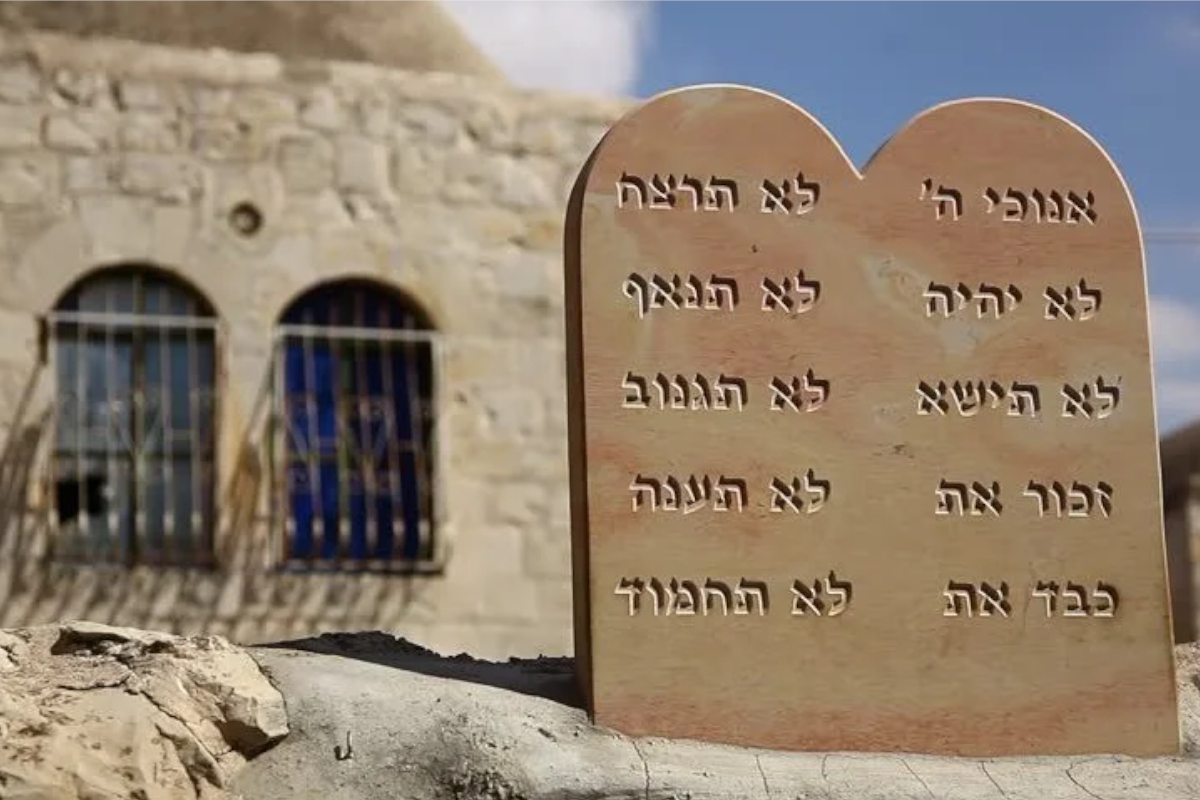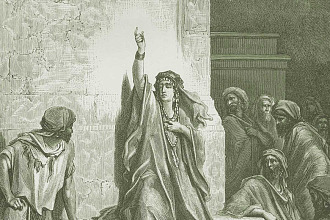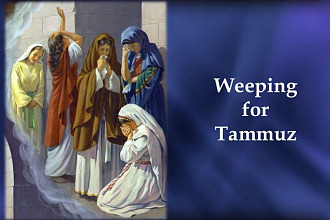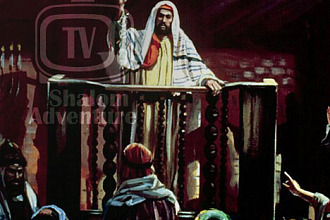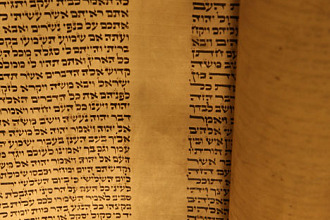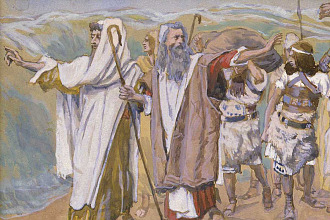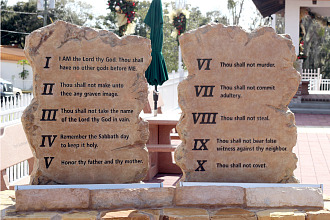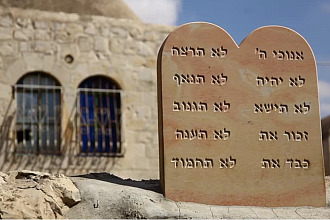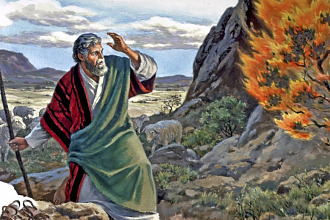Parasha for the Week: Yitro: Exodus 18:1 - 20:23.
Haftarah for the Week: Isaiah 6:1 - 7:6; 9:5 - 6.
Apostolic Writings: Romans 8:9 - 10.
Overview
Hearing of the miracles G-d performed for Bnei Yisrael, Moshe’s father-in-law Yitro arrives with Moshe’s wife and sons, reuniting the family in the wilderness. Yitro is so impressed by Moshe’s detailing of the Exodus from Egypt that he converts to the G-d of Israel.
Seeing that the only judicial authority for the entire Jewish nation is Moshe himself, Yitro suggests that subsidiary judges be appointed to adjudicate smaller matters, leaving Moshe free to attend to larger issues. Moshe accepts his advice.
Bnei Yisrael arrive at Mt. Sinai where G-d offers them the Torah. After they accept, G-d charges Moshe to instruct the people not to approach the mountain and to prepare for three days. On the third day, amidst thunder and lightning, G-d’s voice emanates from the smoke-enshrouded mountain and He speaks to the Jewish People, giving them the Ten Commandments:
- Believe in G-d.
- Don’t worship other “G-ds.”
- Don’t use G-d’s name in vain.
- Observe the Shabbat.
- Honor your parents.
- Don’t murder.
- Don’t commit adultery.
- Don’t kidnap.
- Don’t testify falsely.
- Don’t covet.
After receiving the first two commandments, the Jewish People, were overwhelmed by this experience of the Divine request that Moshe relay G-d’s word to them. G-d instructs Moshe to caution the Jewish People regarding their responsibility to be faithful to the One who spoke to them.
Yithro’s Conversion
Yithro had the privilege to see his name associated to the name of a parasha, even though he was not Hebrew or Israelite. Yithro is presented in the Bible as a man who worshiped G-d. He was a shepherd, and also priest of Midian. That means he had some knowledge about the true G-d. How did he get this knowledge? Certainly from his parents.
Let’s remember that Yithro was a Midianite: that means a descendant of Midian, who was the son of Abraham and Keturah. Abraham has taught to all his sons and daughters the revelations he received from G-d, then all of them were free to follow his teaching or not. Yithro had the privilege to belong to a lineage who accepted the religion of Abraham, and as it was a custom at that time, the father was the priest of this family, an extended family that became a tribe. Thus Yithro was priest of his Abrahamic faith.
But when he came to visit Moses and the camp of the Israelite, the Torah states: “Yithro rejoiced for all the good that the L-rd had done to Israel, in delivering them from the Egyptians. Yithro said, “Blessed be the L-rd, who has delivered you from the Egyptians and from Pharaoh. Now I know that the L-rd is greater than all gods, because he delivered the people from the Egyptians, when they dealt arrogantly with them.” And Yithro, Moses’ father-in-law, brought a burnt offering and sacrifices to G-d; and Aaron came with all the elders of Israel to eat bread with Moses’ father-in-law in the presence of G-d” (Exodus 18:9-12).
This text gives two indications: 1) He blessed the L-rd: “Blessed be the L-rd, who has delivered you;” and 2) He confessed the L-rd: “Now I know that the L-rd is greater than all G-ds.”
Then, He offered a sacrifice to G-d: “Yithro, Moses’ father-in-law, brought a burnt offering and sacrifices to G-d.”
The NIV translates the Hebrew expression òìä åæáçéí as “burnt offering” and Rabbi Hirsch says that this expression means: “offering of devotion and offering of joy.”
Thus, we can affirm that Yithro, declared his faith to the G-d of Israel and worshiped him. In the modern sense, he converted to the G-d of Israel, accepting the Torah, Ten Commandments included. However, he did not stay with the people of Israel, he returned to Midian, his home country, that means he was not incorporated to the people of Israel. This example of Yithro is a good one to remind to Israel that they are the light of the world; in this way, they have to bring the world to the G-d of Israel and the Bible, and the 10 commandments which are studied this week, are not only for Jews but for everyone who believe in the G-d of the Bible.
Teaching Laws
Here is one piece of advice given by Yithro “You must also clarify to them the statutes and the teachings, and make known to them the way in which they are to go and the deeds they are to do” (Exodus 18:20). The role of a leader is also to explain the statutes, laws, and all the rules that G-d has given to His people.
Commenting this verse, Rabbi Hirsch says that the first Hebrew word of this verse is a very important one, Vehizhartah, which is only in this text in the “double accusative”, it means “to let oneself be warned.” On the other hand, the root denotes “brightness”, “shining light” and “to radiate light”. The root Hazahir then denotes “throwing light on something for someone which otherwise he would not have seen or noticed.”
The first Hebrew word of our verse, Vehizhartah, means “to cause the statutes and the teaching to shine clearly and brightly before their eyes.” Or “to make the statutes and teachings so important in the people’s eyes that they guard them-selves against transgressing them.”
The 613 commandments have been divided by the Jewish people between positive commandments (248) and negative commandments (365). The Jewish rabbis affirm that this word Vehizhartah is addressed to Moshe in order to inform the people of Israel about this distinction between the negative and the positive commandments.
Rabbi Hirsch, in his comments, says “Moshe here is told as follows: ‘Teach them the way in which they are to go in securing their livelihood and well-being. Ordinarily, people seek only their own welfare. In the case of the people of Israel, however, not only are they to act with loving kindness toward one another, but this loving kindness is to be their purpose in seeking their own welfare. Everyone is to look out for himself, only for the sake of his neighbor. Moreover, acting benevolently toward others takes precedence over safeguarding one’s own life; for example visiting the sick (even if there is danger of infection), and upholding one’s own prestige (attending to the dead and their burying without regard to one’s position or age) etc. . . .”
A person who has not received the radiant light of the Torah’s instruction will take the goal of their way through life to be strictly their own benefit and welfare. When you enlighten them, they will realize that their existence and livelihood on earth are none other than for the sake of others; they will seek the way of grace and love, and through self-sacrifice will pursue this way and devote themselves to it with every fiber of their being.
Rabbi Hirsch goes very far in his demand of Chesed and Tsedakah (love and justice). He says that “A person forgets however, that his actions may be strictly fair and correct, and the other party may have no right to demand anything else from him; yet for their own sake considering the worth of their own moral personality and due to the mission of love and self-sacrifice devolving upon their personality, they may be obligated to act differently and do more. One must go beyond the strict requirements of the law and renounce one’s right. A judge may not demand this of a person, but every seeker of justice should demand it of themselves. Yithro thinks that this teaching, too, concerning the highest level of moral and social obligation, must come from Moshe himself.
This advice from Yithro applies not only about the mitsvot, which have not yet been given, but also to general human obligations and ethics.
Elections of Leaders
How elections or appointments of leaders are processed in our communities? We know that it is in this parasha that Yithro gave advice to Moses about the appointment of leaders. It was not Moshe who appointed all these leaders of 10, 50, 100 and 1000. It was through a democratic process that the people of Israel chose their leaders. In the book of Deuteronomy it is written: “At that time I said to you, ‘I am not able to bear you by myself. . . . Choose for your tribes wise, understanding, and experienced men, and I will appoint them as your heads.’ And you answered me, ‘The thing that you have spoken is good for us to do’” (Deuteronomy 1:9-14). The three important qualities are: Wisdom, Understanding, and Experience.
We can be sure that the people of Israel made the best choice about the most capable men, and they were more careful in choosing the leaders of thousands than the leaders of tens; that is why we know that they had four levels of leaders and of proficiency and reliability.
This kind of government was kept in Israel for at least fifteen centuries. Rabbi Hirsch says that just as under Moshe there were four judicial levels, each one superior to the next. So too, in later generations, in the days of the Jewish state, there were four grades of courts under the supreme Sanhedrin (that plays the role of Supreme Court), which took the place of Moshe. A court of three judges sat in every community; a court of twenty-three sat in every large city; two courts of twenty-three sat in Jerusalem; one at the entrance to the Temple Mount, and one at the entrance to the Temple courtyard; and the supreme tribunal, the court of seventy-one (the Sanhedrin), sat in the Stone Hall of the Temple.
Just as here the first judges of Israel were chosen by the people and from among the people, so too, according to the Halachah, a judge must be approved by the people’s representative.
There were a large number of Judges in Israel. In fact, if we divide 603,550 people by the 79,065 leaders (judges), we discover that one on 7 or 8 people in Israel was a judge. And when we consider that the judge should be a good man, wise, honest, full of understanding (of the Torah), thus every man in Israel is expected to live an honest life and not to be ignorant of the Torah.
If in Israel each and every member of the nation was a bearer and representative of the Torah (Bible), what about G-d’s people today? Are we wise, honest and full of Bible knowledge?
Haftara: Isaiah 6:1-7:6; 9:5,6
The text of the Haftara is a revelation of G-d to the prophet Isaiah and his calling for the ministry: “Then I heard the voice of the L-rd saying, “Whom shall I send, and who will go for us?” And I said, “Here am I; send me!” (Isaiah 6:8).
In the parasha G-d revealed himself to the people of Israel: Then the L-rd said to Moses, “I am going to come to you in a dense cloud, in order that the people may hear when I speak with you and so trust you ever after” (Exodus 19:9). Miriam was the first prophetess of Israel. G-d uses men and women to reveal his will to the humanity.
The vision of Isaiah was extraordinary with wonderful and great manifestation of the L-rd “I saw the L-rd sitting on a throne, high and lofty; and the hem of his robe filled the temple. Seraphs were in attendance above him; each had six wings: with two they covered their faces, and with two they covered their feet, and with two they flew. And one called to another and said: “Holy, holy, holy is the L-rd of hosts; the whole earth is full of his glory.” The pivots on the thresholds shook at the voices of those who called, and the house filled with smoke” (Isaiah 6:1-4).
When the L-rd appeared to Israel on the Mount Sinai it was also an extraordinary appearance and with wonderful manifestation: “On the morning of the third day there was thunder and lightning, as well as a thick cloud on the mountain, and a blast of a trumpet so loud that all the people who were in the camp trembled. . . . Now Mount Sinai was wrapped in smoke, because the L-rd had descended upon it in fire; the smoke went up like the smoke of a kiln, while the whole mountain shook violently. As the blast of the trumpet grew louder and louder, Moses would speak and G-d would answer him in thunder. (Exodus 19:16; 18, 19).
Apostolic Writings: Romans 8:9-10
We already have said in our Apostolic Writings, comments that Living in this world is not easy, and, according to Rabbi Shaul and the Hebrew Bible, there is no righteous; we are born with a sinful nature, and it is certainly not our way of keeping the law that will change our nature.
There are some people who have a wrong understanding of their relationship with G-d or even with the law of G-d, thinking that observing the 613 commandments will help them to be seen as righteous. The letter Rabbi Shaul has written to the believers in Rome is clear in this perspective. “For by works of the law no human being will be justified in his sight, since through the law comes knowledge of sin” (Romans 3:20).
The law and even the Ten Commandments have not been given for righteous people to boast about, saying: look at me, I am a righteous, I am faithful to the Law of G-d. Failure is in human nature; whatever we do, we fail. As long as we consider ourselves as righteous -- because our keeping of the 613 commandments -- we will not be in the right path. “Do you see a man who is wise in his own eyes? There is more hope for a fool than for him” (Proverbs 26:12).
We are not criminal; we don’t deserve the death penalty, like all these murderers who are waiting on death row. But according to which standards? Human standards? Or G-d’s standards? Yeshua, who spoke most of the time with the Pharisees and other self-righteous, tried to push their reflections on the law to their extremity.
“You see yourselves as righteous, but let me tell you . . . . You have heard that it was said to the people long ago, ‘Do not murder, and anyone who murders will be subject to judgment.’ But I tell you that anyone who is angry with his brother will be subject to judgment” (Matt 5:21-22). Men look at the external things; G-d looks at the heart.
The law has been given to us in order to help us to discover our true nature and the meaning of the word “sin.” Without the Law of G-d, it is impossible to know what “sin” is. That is why Rabbi Shaul explains: “For Messiah is the [Telos] perfect fulfillment of the law for righteousness to everyone who believes” (Romans 10:3-4).
It is only when we discover that it is the Messiah who is the perfect fulfillment of the law that we discover our need of the Messiah. Without him and his perfection upon us, it is impossible to please G-d. Consequently, the Law of G-d is affirmed by the Messiah and not canceled, “Do we, then, nullify the law by this faith? Not at all! Rather, we uphold the law” (Rom 3:31).
We uphold the law, because it is the law that leads us to the Messiah, and as good Jews, we affirm: “So the law is holy, and the commandment is holy and righteous and good” (Romans 7:12). The Parasha for this week describes, after the establishment of leaders and judges, one of the most famous stories in human history: the giving of the Ten Commandments on Mont Sinai. G-d spoke to the entire community of Israel, writing his perfect law on stones to be sure that no one will affirm in the future that these laws are not valid anymore.
In Romans 13, Rabbi Shaul, after speaking about the authorities and judges, said about the law: “the commandments, “You shall not commit adultery, You shall not murder, You shall not steal, You shall not covet,” and any other commandment, are summed up in these words: “You shall love your neighbor as yourself.” Love does no wrong to a neighbor; therefore love is the fulfilling of the law” (Romans 13:9-10). The perfect fulfillment of the law is loving “G-d” and “your neighbor.”
The perfect illustration of this love was Yeshua who went to the ultimate expression of this love, “giving his life for his friends.” Wonderful words from Yeshua to his disciples: “Greater love has no one than this, that someone lay down his life for their friends. You are my friends if you do what I command you” (John 15:13–14). He gave his life for his creatures which became his friends, “No longer do I call you servants, for the servant does not know what his master is doing; but I have called you friends, for all that I have heard from my Father I have made known to you” (John 15:15). Can we imagine greater love than this one?
That is why we can affirm that Yeshua is the perfect fulfillment of the Law of God. The two tablets given to Israel in Parasha Yithro are the description of the character and life of Yeshua.
The Hebrew Bible confirms this love of a friend, King Solomon has written in the book of Proverbs: “A friend loves at all times, and a brother is born for adversity” (Proverbs 17:17).

